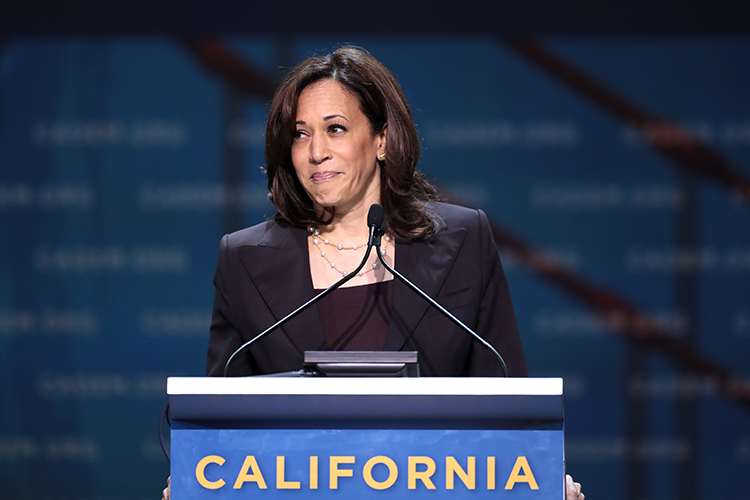Even in Liberal California, Support for Top Democrats Declines, Polls Find

Support for President Joe Biden, Vice President Kamala Harris and long-time U.S. Sen. Dianne Feinstein has fallen sharply among California voters, a new signal of the challenges facing Democrats in upcoming congressional elections, says a new UC Berkeley poll.
The poll, released yesterday by Berkeley’s Institute for Governmental Studies (IGS), found the state’s voters evenly split in assessing Biden’s job performance. But that’s a remarkable slide from April 2021, when 62% of voters approved of his performance and 34% disapproved.
Berkeley political scientist Eric Schickler, the IGS co-director, said Biden’s struggles in California are consistent with a national pattern. But the fact that support for the Democratic administration is weakening — even in liberal California — could have “significant” implications for the November elections, Schickler said.
“If the situation doesn’t turn around, you’re looking at a really bad midterm climate for Democrats,” he explained in an interview. “When Biden is polling this way in California, that’s just an indicator that, across the country, Democrats are going to be in a major uphill fight to hold onto the House and hold onto the Senate.”
Biden has faced profound challenges — the continuing COVID-19 pandemic, spiking inflation and rising murder and property crime rates — that are largely beyond a president’s control. And while deep Republican opposition is no surprise in the current polarized environment, the Berkeley IGS Poll found that Biden’s support was lagging among California voting blocs that typically show strong support for Democrats.
Among California voters ages 18 to 29, just 34% of poll respondents approve of Biden’s job performance, while 53% disapprove. Asian/Pacific Islander voters approve by a margin of just six points, while the margin among Latinx voters is five points.
Black voters, on the other hand, approve of Biden’s work by a margin of 54% to 39%. And voters 65 and older approve by a margin of 57% to 42%.
While the IGS poll shows 47% of voters overall approve of Biden’s performance and 48% disapprove, the numbers for other veteran Democrats are as bad — or worse.

A separate IGS poll released this week showed that approval of California Gov. Gavin Newsom’s performance has fallen from 64% in September 2020 to 48% this month, numbers that closely parallel Biden’s.
Harris wins approval from just 38% of voters, compared to 46% who disapprove. And ratings for Feinstein have fallen to their lowest levels since she became a U.S. senator in 1992: Just 30% approve, versus 49% who disapprove.
U.S. Sen. Alex Padilla, also a Democrat, wins approval from 34% of voters, while 26% disapprove. But he’s been in office for little more than a year, and 40% have no opinion.
The two polls released this week by the IGS did not address why support for leading Democrats has fallen. But Schickler suggested that a variety of factors are at work.

Generally, he said, national polls show that Americans are in an unhappy, pessimistic mood. By margins of roughly two-to-one, they think the country is going in the wrong direction. The newest IGS poll shows that only 20% of California voters approve of the job Congress is doing, compared to 72% who disapprove.
Of course, the perception of why the country is on the wrong course might differ vastly between the left and the right. And while the numbers for each government leader reflect voter frustration, the dynamics of dissatisfaction may be different, Schickler said.
For example, he noted, Harris is a target of fierce, ongoing attacks from the right wing.
How much of her low rating reflects that “the role of the vice presidency is a really hard one to navigate?” he asked. “How much of it has to do with race and gender?”
Feinstein’s declining marks preceded the arrival of Biden. She’s long had an uneasy relationship with the progressive wing of the Democratic Party, Schickler said, and that tension may be getting worse.
“We’ve seen stories about her age (she’s 88), and the sense that she may be less in touch with changing currents in the party,” he said.
While the polling signals give Democrats reason to be pessimistic, conditions could shift. Data shows that, in particular, the American middle class and lower classes have benefited in the recent economy. If inflation eases, if the pandemic eases, if the risk of war with Ukraine recedes, voter sentiment could shift by autumn.
“It’s always the case that when voters are frustrated with the economy or the general situation in the country, the president tends to take a lot of blame for that,” Schickler said.
“So there are some voters the Democrats may be able to get back. But there is incredible energy … on the right, among Republicans. That’s probably baked in — we’re now in an era when the ‘out party’ is always going to be really mobilized. The question is: Can you get your own folks engaged?”
The Berkeley IGS Poll is a periodic survey of California public opinion on important matters of politics, public policy and other issues.
The IGS reports released this week are based on an online survey of 8,937 registered California voters that was administered online in English and Spanish from Feb. 3 to 10. The margin of error is approximately two percentage points.
